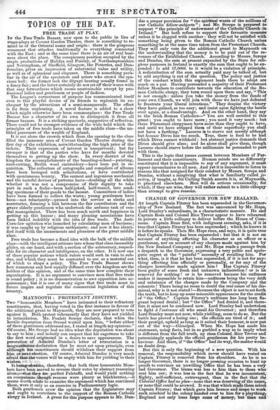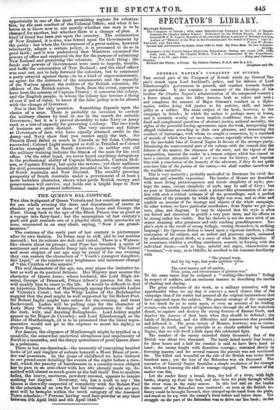CHANGE OF GOVERNOR FOR NEW ZEALAND. AT length Captain Fitzroy
has been superseded in the Governor- ship of New Zealand. The fact was announced by Mr. Hope, Lord Stanley's subordinate, in a characteristic manner. He and Captain Rous and Colonel Rice Trevor appear to have rehearsed in private a little colloquy to deliver before the House of Com- mons. Captain Rous first, with indignant seeming, asks if it is true that Captain Fitzroy has been superseded ; which he knows it is before he speaks. Then Mr. Hope rises, and says it is quite true that Captain Fitzroy has been superseded : but thin it is not on account of anything affecting his character as an officer or a gentleman nor on account of any charges made against him by the New Leland Company; and Mr. Hope reads a passage from a despatch to the Governor, expressing a very polite and apolo- getic regret at the "painful" necessity of recalling him. For what, then, is it that he has been superseded, if it is not for any- thing affecting him officially or personally, or for any of the charges heretofore made against him ? Has Captain Fitzroy been guilty of some fresh and unknown indiscretion ? or is he removed for nothing? or is he removed because his unfitness makes it impossible to retain him—unfitness being the very drift and substance of the charges made by the Company and the colonists ? There being no room to doubt the real cause of his dis- missal, why is it not stated 1—Because the object is not to set forth the truth, but to keep up some miserable appearances for the credit of "the Office." Captain Fitrroy's unfitness has long been fla- grant beyond denial ; but "the Office" had denied it, and there- fore it must not be confessed now. Lord Stanley had undertaken to fight a routrance all who assail his Governor ; and therefore Lord Stanley must not now, while yielding, seem to do so. But the battle has proved a losing one ; the officials are tired of it ; and their protege, upheld as long as it suited their humour, is now put out of the way—Glenelgetl. When Mr. Hope has made his statement, using facts, but in so garbled a way as to imply what is different from the full truth, up rises Colonel Rice Trevor and. patronizingly applauds the official, gentleman for his pretty be- haviour. And there, if "the Office" had its way, the matter would. no doubt drop. But this is only the beginning of a new question. With his removal, the responsibility which never should have rested on Captain Fitzroy is removed from his shoulders. As he is no longer Governor, there is no longer pressing occasion to hunt up proofs to convince an unwilling Office that he has been a very bad Governor. The blame was less to him than to those who sent him out; it was less in the fact that he was inconsistent, flighty, self-sufficient, extravagant, than in the fact that the Colonial Office hail no plan—none that was deserving of the name, or none that could be avowed. It was that which made them select Captain Fitzroy; that which gave him licence and scope to work such mischief to the colony handed over to him for a plaything. England not only loses large sums of money, but time and opportunity in one of the most promising regions for coloniza- tion, by the past conduct of the Colonial Office ; and what it be- hoves us to know now is' not merely whether one man is to be changed for another, but whether there is a change of plan. A kind of fraud has been put upon the country. The colonization of New Zealand, it is true, was forced upon the Government by the public : but when the Government of a great nation, however reluctantly, adopts a certain policy,- it is presumed to do so in good faith ; and it was understood that Ministers exercised the powers of office and employed its fisc for the purpose of colonizing New Zealand and protecting the colonists. No such thing : the funds and powers of Government were used to impede, trouble, and baffle the colonization of New Zealand ; and the chief officer was sent out, not to help forward the colonists, but to command a party arrayed against them—to be a kind of super-missionary, an agent for the interests of the missionaries and the rapacity of the Natives against the welfare of the British colonists, the offshoot of the British nation. Such, from the event, appears to have been the mission of Captain Fitzroy : it concerns the colony, and the English people, to whom the colony has become a thing of cost if not of value, to know if the false policy is to be altered with the change of Governor. Nor is that the only question. Something depends upon the choice of a man. There is probably no occasion to exclude the military classes by land or sea in the search for suitable Governors but it is a proved absurdity to take Navy or Army rank as a test of capacity, for governing a colony. The two kinds of business are quite distinct. The very success and failure as Governors of men who have equally attained credit in the Army and Navy show that you cannot apply the test. Sir Francis Head failed as much in Canada as Sir John Colborne succeeded; Colonel Light managed as well in Trinidad as Colonel Gawler managed ill in South Australia : in neither case did the military training indicate the fitness of the man for his civil office. On the other hand, we never heard anything derogatory to the professional ability of Captain Hindniarsh, Captain Hob- son, or Captain Fitzroy, but quite the reverse ; yet their unfitness for civil government is lamentably recorded in the early disasters of South Australia and New Zealand. The steadily growing prosperity of South Australia under a government of at least a more harmless character, shows what perils British energy and perseverance will survive, and holds out a bright hope to New 7.ealand under its present inflictions.



























 Previous page
Previous page